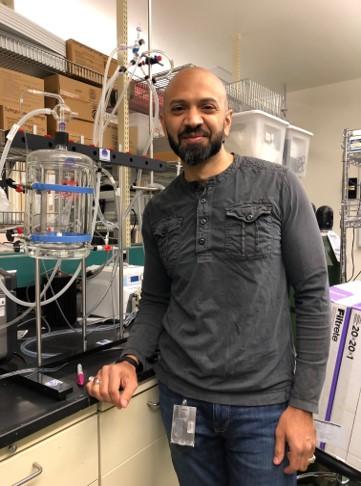Meet EPA Scientist Mehdi S. Hazari, Ph.D.
EPA scientist Mehdi S. Hazari is a recipient of the 2011 Presidential Early Career Award for Scientists and Engineers. The award is the highest honor bestowed by the U.S. government on outstanding science and engineering professionals in the early stages of their independent research careers.
Dr. Mehdi's award recognizes his work demonstrating how breathing in low levels of air pollutants, such as particulate matter and ground level ozone, can increase people's susceptibility to heart attacks and other cardiac events. His research is also receiving international recognition and is under consideration for inclusion in the update of worldwide standards.
 Meet EPA scientist Mehdi Hazari!What do you like most about your research?
Meet EPA scientist Mehdi Hazari!What do you like most about your research?
The opportunity to try something new in the laboratory, but more broadly, the direct impact it can potentially have on protecting human health and the environment.
How does your science matter?
Despite the fact that we are learning quite a bit about how air pollution is directly detrimental to the body, particularly when adverse symptoms are observed, we still need to better identify the latent (hidden) effects of exposure. This is especially true of low concentration exposures to air pollution during which no direct responses may be observed.
My work demonstrates that even in the absence of obvious "symptoms," air pollution might have the potential to cause subtle internal body changes that increase the risk of triggering something bad happening to your heart, such as an arrhythmia. We all know that exercise is generally a good thing, but its hard physical activity that does create mild to moderate stress on the body. Add high air pollution levels into the mix on a hot day, and instead of getting healthier, that stress might be the trigger for an adverse response. Doing that same activity in a healthy air environment might not. And in the case of stress, it doesn't have to be just air pollution. The triggers might be any stressful stimuli.
Again, I think my science matters because of the direct impact it can potentially have on protecting human health and the environment.
If you could have dinner with any scientist past or present, who would it be and what would you like to ask them about?
William Harvey—the English physician and physiologist who completely described the cardiovascular system.
When did you first know you wanted to pursue science?
Probably since high school, but I only became interested in research after starting graduate school.
Tell us about your science/educational background.
I received my bachelor's degree from the Florida Atlantic University in Medical Technology, M.Sc. from the University of Toronto and Ph.D. in physiology from Johns Hopkins University, Bloomberg School of Public Health.
I knew I wanted to be a physiologist, but my scientific interests became more focused on neurophysiology after taking a neuroscience course at the Hopkins School of Medicine, and after joining the laboratory of my graduate mentor, Dr. Allison Fryer.
What brought you to EPA?
Two reasons: I had a few fellowship opportunities available to me upon finishing graduate school, but the chance to do environmentally-relevant human health work brought me to EPA.
Secondly, a guy named Dan Costa, who was the National Program Director for EPA's Air and Energy research program [Dan retired in 2018], he was also (and probably will always be) my mentor. Dan is not only a brilliant and far-sighted scientist and leader, but also just about the best mentor and person in general. It is because of people like Dan and the rest of our scientists who have this common goal that I work at EPA.
If you were not a scientist, what do you think you would be doing?
Teaching.
Do you have any advice for students considering a career in science?
Today, science is so broad and multi-faceted, if you can't seem to find your niche, don't be afraid or hesitate to try a new scientific direction because it is often during the process of that struggle that we truly discover our calling. Oh, and find yourself a good mentor!
Editor's Note: The opinions expressed herein are those of the researcher alone. EPA does not endorse the opinions or positions expressed.
